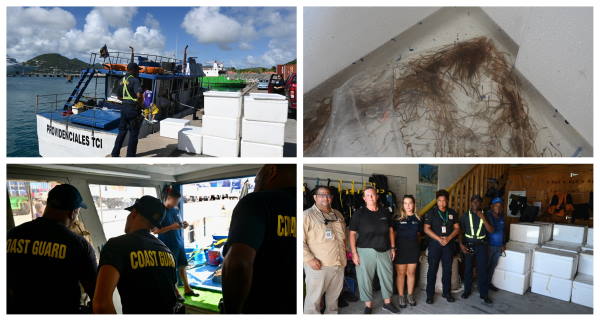 PHILIPSBURG:--- An estimated 66,000 endangered smuggled eels worth over USD 30,000 were seized from a vessel in Philipsburg by the Dutch Caribbean Coast Guard, Nature Foundation Sint Maarten, and Customs early this month. Officials from both Sint Maarten and the Dominican Republic, where the vessel departed, have begun working in close cooperation to identify, intercept, and return the smuggled eels to their place of origin.
PHILIPSBURG:--- An estimated 66,000 endangered smuggled eels worth over USD 30,000 were seized from a vessel in Philipsburg by the Dutch Caribbean Coast Guard, Nature Foundation Sint Maarten, and Customs early this month. Officials from both Sint Maarten and the Dominican Republic, where the vessel departed, have begun working in close cooperation to identify, intercept, and return the smuggled eels to their place of origin.
On December 5, the Coast Guard carried out controls on a transporter vessel from the Dominican Republic and alerted the Nature Foundation to the presence of over 25 boxes of live eels on board, which were not identified by species and did not have an import permit. As the authority for the Convention on International Trade in Endangered Species of Wild Fauna and Flora (CITES) in Sint Maarten, the Nature Foundation quickly communicated with the CITES authority of the Dominican Republic, who connected them with CODOPESCA, the country’s national fishery authority. CODOPESCA identified the species as the endangered American eel (Anguilla rostrata) and confirmed that the Dominican-issued documents presented by the crew were fraudulent and incorrect, constituting an illegal operation.
Two representatives from CODOPESCA flew in from the Dominican Republic to assist with a full seizure on December 6. During the confiscation, thousands of live eels, an oxygen tank, and related equipment were confiscated and released into the Nature Foundation’s care. The eels, totaling 9.48 kilograms (20.7 pounds), were kept alive through the weekend by CODOPESCA’s aquatic specialist and a rotating team of Nature Foundation staff, until they were shipped back to the Dominican Republic via air cargo on December 9. They will be carefully monitored before being released into the country’s freshwater and estuarine ecosystems.
While the crew of eight was permitted to leave the island without additional prosecution, the CODOPESCA authorities warned local officials that Sint Maarten is a likely hotspot for trafficking due to its minimal entry and exit regulations for wildlife and animal products. The poaching, smuggling, and sale of Anguilla rostrata is widespread across the Caribbean. Generally, the eels are caught illegally in their native range of Hispaniolan rivers, from which they are then smuggled to East Asian aquiculture operations through various airports and harbors, such as those on Sint Maarten, to be grown until they can be harvested.
“While we are very proud of this joint accomplishment and the level of coordination displayed by all parties, this situation highlights a serious issue that has gone under the radar here,” stated the Nature Foundation. “Based on past and ongoing conversations with international authorities, we believe that illegal wildlife trafficking – not just for eels but other species as well - is severely underreported in Sint Maarten. The need for more stringent trading regulations and intensive agent training has been made very clear by this incident.”
The international capture of Anguilla rostrata has soared in recent years and resulted in the species’ overexploitation and subsequent IUCN Red List “Endangered” status, driven by high demand in the food market in various East Asian countries. International prohibitions and depleted fish stocks involving the European and Japanese eel species have resulted in importers turning to the lesser-protected American eel, creating an illicit market in the Caribbean. Valued between USD 3,250 and USD 3,950 per kilogram, the shipment was likely upwards of USD 37,000 during the holiday season, according to the CODOPESCA authorities.
While Sint Maarten officials and CODOPESCA will begin working in closer cooperation to intercept and reduce eel trafficking activities, community support is critical. Observers of any suspicious activity around marinas, warehouses, or cargo areas are encouraged to report potential wildlife trafficking activity immediately. Call the Coast Guard at 913 or send them a WhatsApp at +5999 5100913, and let the Nature Foundation know as well via WhatsApp at (+1) 721-581-6365.











